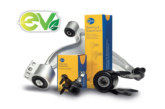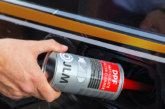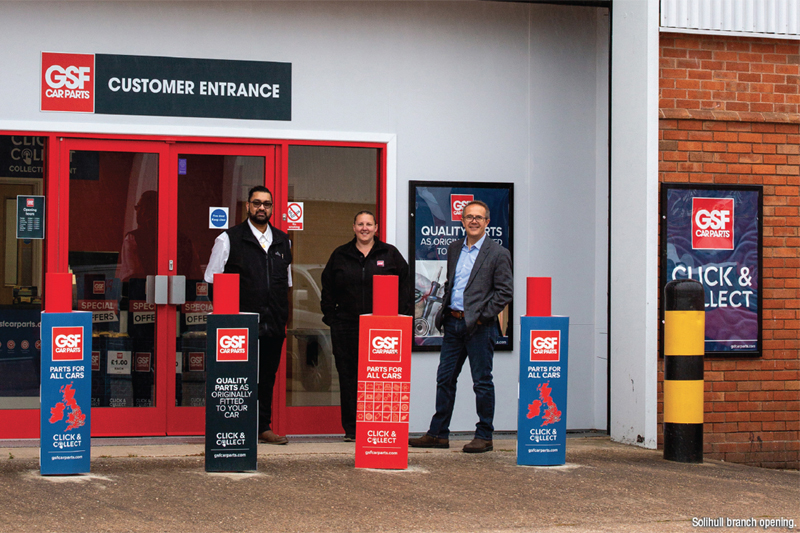
After overseeing a rebrand that saw GSF Car Parts transition from a dozen local trading identities to one national brand, the motor factor’s president and chief operating officer, Mark Eburne, offered us the opportunity to quiz him on how the concept turned into reality.
The journey began in November 2021 and in that time GSF has fitted new signage, changed more than 1,000 vehicle liveries and installed new branding across all of its stores. All members of staff have received shiny new uniforms.
In addition, it has opened nine new branches – the latest being St Helens in July – taking the overall tally to 185 across the UK and Ireland. GSF has also bought 300 vans to complement the openings.
It’s here Mark and I began our conversation, and I started by asking him if it was fair to describe GSF’s approach as ‘aggressive’:
“It depends on your perspective, doesn’t it?” he replied. “In my view, optimistic is probably more accurate. We’ve worked tremendously hard and accomplished what we set out to do. We have a single brand, a single message and a consistency that is the accomplishment of a two-year programme condensed into six months.
“We’ll now take time to absorb what we’ve achieved, pause proceedings for a couple of months, before we pick up the mantle again in the autumn where more branch expansions are planned.”
On the locations of the branches, I was curious to learn the strategy behind them – was it a case of filling gaps or bolstering regions where demand was particularly high? Mark was candid in revealing how GSF goes about its business:
“We look for whitespaces between our existing branches, where we think there’s the greatest opportunity to infill a branch to support the network. It’s a balance of reason; we structure our branches into regions, we try and keep all the regions the same size; therefore, we spread the branch openings geographically around the country, so that the regions can thrive.
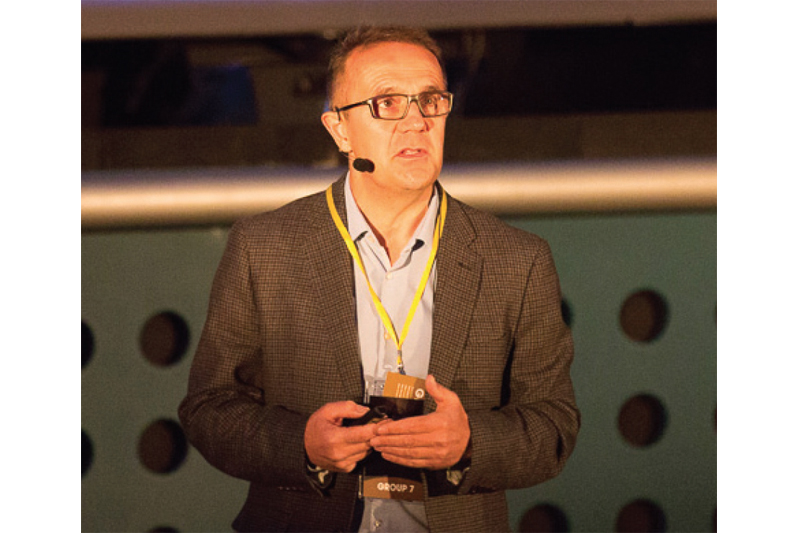
“We try balance that with the belief that branches work better in packs. If you run more than one branch in a region, they can feed off each other and more resources can be used to bed them in and support them as they become an ‘up-to-speed’ GSF branch.”
Home is where the heart is
GSF Car Parts is part of Uni-Select, a distributor of automotive refinish and industrial coatings in North America. When Uni-Select announced that The Parts Alliance would become GSF Car Parts, introducing one trading name across all of its sites, it enabled the former to revert back to its role as a trading group and GSF Car Parts, Dingbro and Qualvecomm running as three entities.
Mark hailed it as a “milestone moment” and marked the beginning of an “exciting journey”. At the same time, he identified opportunities to “expand, diversify and upskill”.
When GSF Car Parts announced the opening of its Yeovil branch, it was revealed that there was a mixture of existing GSF staff and new recruits making up the team. When pressed on whether this was a deliberate tactic, Mark replied: “Absolutely!”
He continued: “We have enough density that we can open branches with some element of new and existing staff – it’s a formula that’s always worked well for us, and we’ll continue to do that should the opportunity arise.
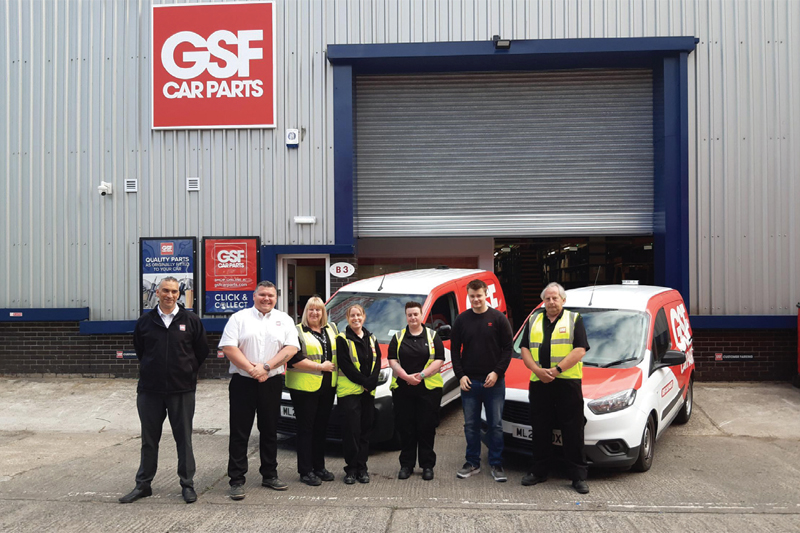
“Using Yeovil as an example, the manager and assistant manager both live in the town, but worked in branches inand- around Somerset, so when we opened the Yeovil store, we were fortunate that we had two senior colleagues that could step into those roles – it’s always an advantage, if your staff know the area and people they’re selling to.”
Challenge of recruitment
One of the hot topics of conversations within the market – we’ve shared some of them inside issues of Professional Motor Factor this year, both from a factor and supplier point of view – has been on the subject of recruitment and how we, as an industry, can demonstrate the value and appeal of working for either a garage, distributor or supplier.
I took the opportunity to ask Mark if recruiting, not just people but the right people, was straightforward or a tough process: “We’re finding it more and more difficult to find good people, at all levels. There’s a scarcity of labour for every role. We don’t receive many applicants for jobs – some we do, but most of the time we don’t.
“It’s not just an automotive problem; whatever business you’re in, recruiting people is a challenge, and no-one is finding it easy.
“We employ over 2,500 people, so we get retirements, natural churn, expansions, business change, so we’re constantly on the recruitment drive. The difficulty is finding the appropriate person and them wanting to stay for the long-term. We find that once staff have stayed with us for at least a year, they’re more likely to stay for the foreseeable.
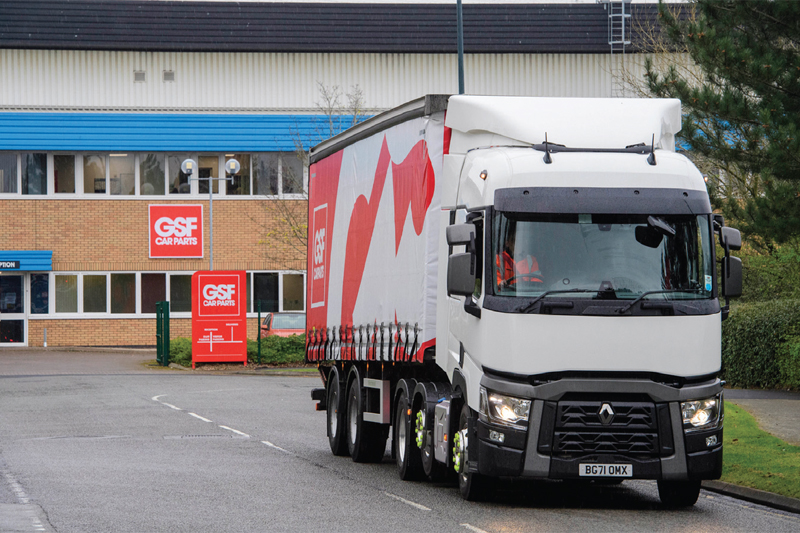
“We find that people with more experience and want stability, are more loyal to the business, so, naturally, they will perform better in their role – it’s about attraction and retention. We’ve done a lot in terms of improving benefits and offering flexible working, trying to make GSF an attractive place to work.
“The recruitment challenge is not unique to GSF – it’s an industry challenge.”
How is GSF staying on top of availability?
With a national distribution centre in Birmingham, home to parts and consumables for all makes and models, tools and garage equipment, all of which supply independent garages, national chains and retail customers, GSF Car Parts is “fortunate in the sense that we can cushion from some of the (availability) effects by the fact we keep stock”.
It’s no secret that availability is an issue that the industry is facing, but because a third of what GSF Car Parts sells is its own brand, it’s in a strong position, according to Mark.
He added: “We have a very strong ‘own brand’ proposition – about a third of what we sell is our own brand, and two thirds is original equipment (OE) products. We sell very little aftermarket – approximately 95% of what we sell is either OE or own-brand, and we only sell OE quality own-brand.
“Sometimes, our own products are manufactured by the OEM. In other cases, we audit the factory and specification, in which case we back-to-back test the product to ensure it is of OE equivalent specification and quality.
“On filters, for example, we guarantee that our filters have the same proportion of paper inside the same OE specification and offer the same filtration capability. On brake pads, we test the friction material, we test the pad as if it was being tested for OE. It’s taken a decade or two to build up a comprehensive programme of OE product that we’re happy with.
“We measure the warranty claims we receive; the warranty claims on our OE product, without exception, are as good as or better than the OE quality product that we sell.”
The future?
When presented with the opportunity to talk to the head of GSF Car Parts, it would’ve been remiss of me to not ask for his views about the impact of electric vehicles (EVs) and how GSF, as well as the industry as a whole, will evolve.
He predicts the industry is going to “change beyond all recognition in the next five to seven years”, that the impact of EVs and hybrids will have a “profound effect” on the automotive aftermarket, and the transition is “happening faster than everyone thought, and the pace will quicken”.
He confirmed GSF Car Parts was gearing up for the future and, specifically, EVs, and that the “winners will be those that take market share”.
How the next few years play out will be fascinating; however, one thing is for sure, GSF Car Parts is ready for the challenge and will continue with its optimistic, bullish philosophy to increase its market share, grow year-on-year and, in Mark’s words, “be the best in our industry”.



